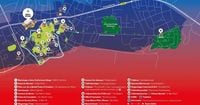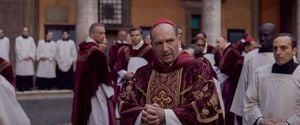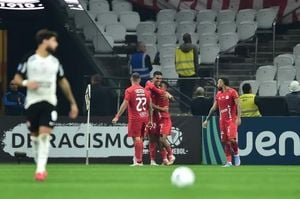On May 5, 2025, Gelderland celebrated the 80th anniversary of liberation, with Wageningen serving as the focal point for the festivities. The day was marked by a series of events aimed at honoring the past while addressing contemporary issues surrounding freedom.
The celebrations kicked off with a significant commemoration at the National Liberation Monument on the 5 Mei Plein in Wageningen, where around 100,000 visitors gathered. This momentous occasion featured traditional elements such as a fly-by of historical aircraft, wreath-laying ceremonies, and a minute of silence to reflect on the sacrifices made for freedom.
Prime Minister Dick Schoof, along with Polish Prime Minister Donald Tusk, participated in the ceremonies, emphasizing the importance of remembrance and the ongoing struggle for liberty. Tusk, who also delivered the 5 May lecture, highlighted the fragility of freedom, especially in light of current global tensions.
The day took a controversial turn when a smoke bomb was thrown during the commemorative events. This incident occurred as Schoof and Tusk were preparing to light the Liberation Fire, a symbolic act marking the official start of the Bevrijdingsfestival Gelderland. Tusk expressed his disapproval of the act, stating, "The throwing of the smoke bomb on Liberation Day is undesirable," during a press conference following the incident.
Mayor Floor Vermeulen of Wageningen condemned the actions of the demonstrators, stating that while protesting is a right, the disruption of a significant remembrance event was inappropriate. He offered his apologies to both Schoof and Tusk for the disturbances, which included a protester shouting 'Free Palestine' during Defense Minister Ruben Brekelmans' speech.
According to a spokesperson for the demonstrators, their choice to protest on Bevrijdingsdag was deliberate. They aimed to draw attention to what they perceive as diminishing freedoms in the Netherlands. "We find it inappropriate and hypocritical that the government is here today to talk about freedom while failing to safeguard it," the spokesperson remarked.
Despite the protests, the day continued with various events, including a freedom meal organized in Arnhem, where attendees were offered free soup. Marieke van Kessel, the coordinator of the meal, explained its significance: "Food connects people. Sitting together at the table allows for conversations about freedom and mutual respect. A bowl of soup helps facilitate that conversation."
In Harderwijk, a liberation lunch was also held, bringing together forty residents from the local asylum seekers' center and forty other inhabitants, fostering community spirit and inclusivity.
The Bevrijdingsfestival, which followed the commemorative events, featured a vibrant lineup of music and cultural activities throughout Wageningen. From rock concerts to DJ sets, the festival aimed to celebrate freedom in a festive and engaging manner. The festival's opening was marked by Schoof lighting the Liberation Fire on the main stage, an event broadcast live by NOS.
As the day progressed, various performances took place across multiple stages, showcasing local and national talent. The diverse programming was designed to appeal to a wide audience, ensuring that the celebration of freedom was both reflective and enjoyable.
The events of May 5, 2025, not only commemorated the historical significance of liberation but also sparked important conversations about current freedoms and the responsibilities of government. The juxtaposition of celebration and protest highlighted the complexity of freedom in today's world.
In summary, the 80th anniversary of liberation in Gelderland was a day filled with rich traditions, poignant reflections, and a reminder of the ongoing challenges faced in safeguarding freedom. While the festivities were marred by protests, they served as a powerful reminder of the importance of dialogue in maintaining liberty and respect for all.





